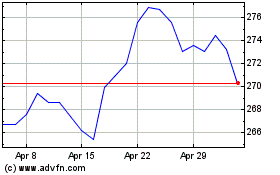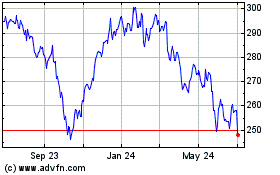By Heather Haddon
McDonald's Corp. said it has fired Chief Executive Steve
Easterbrook because of his consensual relationship with an
employee, the latest challenge for the company as it races to keep
up with changes reverberating throughout the food industry.
The burger giant said Sunday that its board voted Friday to
terminate Mr. Easterbrook after investigating his relationship with
the unnamed employee. Mr. Easterbrook resigned from McDonald's
board as well. He wrote in an email to McDonald's employees on
Sunday that he had violated company policy on personal conduct.
"This was a mistake," Mr. Easterbrook wrote in the email. "Given
the values of the company, I agree with the board that it is time
for me to move on."
A representative for Mr. Easterbrook said he is grateful for his
time at the company and has declined to comment further.
The board was alerted to the relationship, conducted a thorough
investigation and acted swiftly, according to McDonald's. The
company declined to provide any other details.
McDonald's said Mr. Easterbrook would be succeeded immediately
by USA President Chris Kempczinski, 51 years old.
Mr. Easterbrook, 52, has been chief executive since March 2015.
During his tenure, the company's shares nearly doubled in value but
traffic to U.S. restaurants has continued to stagnate. McDonald's
is reckoning with challenges reverberating throughout the food
industry from meat producers to supermarkets as consumers switch to
products that they view as more healthful and big companies
sacrifice profit for technological upgrades and delivery.
McDonald's has invested in updating its sandwiches and
renovating its restaurants to keep up with those changes, but paid
a price in profits. And U.S. franchisees have balked at mandated
investments in digital-ordering kiosks and new menu items like
fresh-beef burgers. Franchisees started an independent association
last year to push back against some of Mr. Easterbrook's
changes.
Mr. Easterbrook said earlier this year that he and other top
executives, including Mr. Kempczinski, had been talking to
franchisees in light of their concerns and had pushed back the
timeline for owners making some capital investments as a
result.
"Wouldn't life be great if everyone was happy? Of course," Mr.
Easterbrook told investors. "Am I fundamentally concerned that it
will derail us from the shared vision that we have? No, not at
all."
Mr. Easterbrook also rolled back offerings including premium
burgers and parts of an all-day breakfast menu after they slowed
down restaurant operations. Wait-times at McDonald's drive-throughs
have climbed in recent years as the company's menu became
increasingly complex.
Mr. Kempczinski, who helped implement many of the recent changes
as head of U.S. operations, said he would maintain Mr.
Easterbrook's focus on technology as CEO and believes the company's
investments will pay off.
"There isn't going to be some radical, strategic shift. The plan
is working," Mr. Kempczinski said in an interview on Sunday.
Mr. Kempczinski said investors should feel confident in the
succession and that he intends to listen to consumers. He also said
he looked forward to continuing to discuss concerns with
franchisees. "It's something we need to solve together," said Mr.
Kempczinski, who will also join McDonald's board.
McDonald's said Joe Erlinger, most recently president of
international operated markets, is succeeding Mr. Kempczinski to
oversee McDonald's roughly 14,000 domestic restaurants.
McDonald's shares, up 9% this year, have trailed the broader
S&P index tracking restaurants in that period, including other
fast-food peers such as Wendy's Co. and Restaurant Brands
International Inc.
McDonald's faces more challenges at the U.S. restaurants that
drives its sales. Labor organizers and some lawmakers have called
on the company to address workplace harassment issues and raise its
minimum wage to $15 an hour.
This year, McDonald's strengthened workplace training and
protocol for reporting potential employee misconduct. Mr.
Kempczinski said the company had a responsibility to address
workplace well-being. The company said this year that it would stop
lobbying against federal minimum wage increases, and that it
recognizes the rights of its employees to join labor
organizations.
The company said details of Messrs. Kempczinski's and
Easterbrook's pay would be disclosed in a filing by Tuesday.
Mr. Easterbrook, who is divorced, had a long career at
McDonald's. Before becoming CEO, he worked as head of the company's
U.K. business, which he helped return to growth by modernizing its
restaurants, revamping the menu and portraying McDonald's as
environmentally friendly -- tactics he later employed at the
company more broadly. Mr. Easterbrook, who was born in Watford,
England, was the second non-American to lead the company, after the
late Charlie Bell of Australia.
Mr. Easterbrook left McDonald's in 2011 to become CEO of
Britain's PizzaExpress Ltd. and then Japanese-style noodle bar
chain Wagamama Ltd. Two years later he returned, eventually
becoming McDonald's global chief brand officer.
Within months of becoming CEO, he enacted several changes,
including committing to switch to cage-free eggs, antibiotic-free
chicken and hormone-free milk; raising workers' pay above minimum
wage and giving different geographic markets more control over the
menu.
His pay as CEO rose with McDonald's share price, which closed
Friday at $194. His compensation peaked in 2017 at a total of $21.8
million including $9.1 million in incentive-based pay. He received
$15.9 million in total compensation last year. He also sits on the
board of Walmart Inc.
Write to Heather Haddon at heather.haddon@wsj.com
(END) Dow Jones Newswires
November 03, 2019 19:34 ET (00:34 GMT)
Copyright (c) 2019 Dow Jones & Company, Inc.
McDonalds (NYSE:MCD)
Historical Stock Chart
From Mar 2024 to Apr 2024

McDonalds (NYSE:MCD)
Historical Stock Chart
From Apr 2023 to Apr 2024
